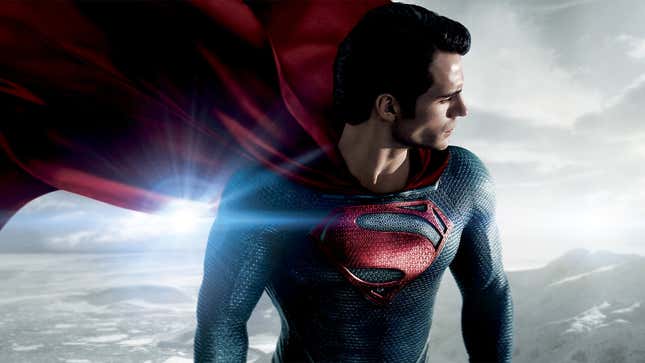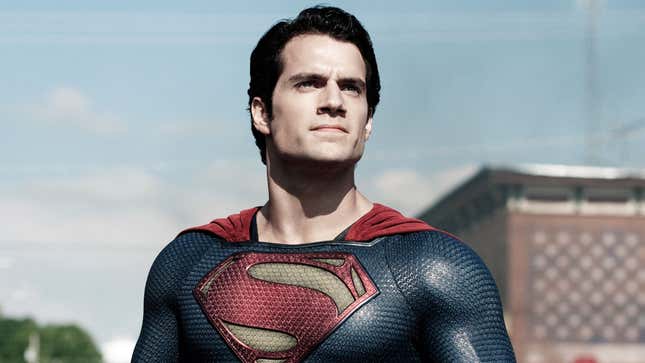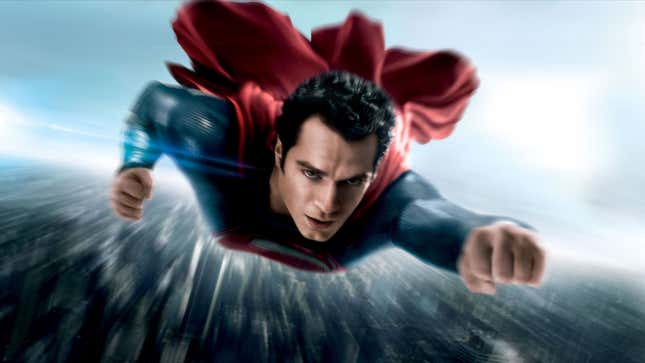
Few superheroes have had as tumultuous a media presence as Superman. Joel Shuster and Jerry Siegel’s 1938 creation grew in popularity outside of comics thanks to Christopher Reeve’s movies and the 1990s cartoon (and the subsequent DC Animated Universe shows that spawned from it). During the 2000s, the character’s live-action efforts consisted of the 10-season Smallville from the WB (now the CW), and 2006’s Superman Returns served as the hero’s last theatrical movie for nearly a decade. Warner Bros. made several efforts to bring Superman to the big screen post-Returns, but nothing came about until Zack Snyder’s now 10-year-old Man of Steel.
It’s impossible to talk about this movie divorced from the larger context that surrounds it, and much of that blame falls on Warner Bros. Christopher Nolan—whose Dark Knight trilogy wrapped in 2012—produced and conceived this film’s story with writer David S. Goyer. For many viewers, Man of Steel was their introduction to British actor Henry Cavill, previously seen in 2011’s Immortals and 2007’s Stardust. And like many genre movies during the 2010s, Man of Steel wasn’t released in a bubble. Before the film’s $668 million global box office had even solidified, WB was already starting to cook up a sequel with Goyer and director Snyder returning.
The DC Extended Universe that came in the wake of Man of Steel was very clearly WB’s answer to the Marvel Cinematic Universe, which at the time was riding high off the billion-dollar successes of 2012's The Avengers and 2013's Iron Man 3. Whereas the Marvel movies gave its heroes solo movies to be followed by a team-up, WB tried for the reverse: bring the Justice League together first, then give its members solo films later on. Instead, the entire enterprise actively imploded around WB, with Snyder and Cavill its two biggest victims. After 2016’s Batman v. Superman: Dawn of Justice opened to a high box office and an even more split fanbase, WB got cold feet about keeping Snyder on for five films; fans are well familiar with what happened next regarding 2017’s Justice League. For Cavill, it was his last full-time tenure with the character, made all the stranger when its ending indicated a more “proper” Superman would come in a Man of Steel follow-up.

After Joss Whedon took over directing duties on League, the DCEU avoided addressing the Snyder of it all. Some post-League movies either danced around its entire existence or just parts of the director’s choices, like the status of Cavill as Superman or Ben Affleck’s Batman. Think about that for a moment: a single (and utterly disposable) movie from 2017 is still making waves across multiple careers. Last year, Cavill departed Netflix’s The Witcher in part to get a second shot at playing Superman in the wake of Black Adam, a plan that lasted for all of about a week before new DC Films head James Gunn killed it dead. This week’s Flash movie is meant to be the definitive, official end for the old DCEU and Snyder’s superhero tenure, helping WB do what it’s tried for years and finally washing its hands of the beast it created a decade ago.
When WB failed to establish a firm, mainstream hold on Superman, it opened the floodgates. Most non-DCEU media featuring the character found itself pitted against this big screen version, and every move made by those other Supermen were perceived as digs at Cavill and Snyder, fairly or not. Outside of WB, media like Invincible and The Boys came at a time when “asshole Superman” was both upsetting and enticing for the character’s fans, and it’s now reportedly come full circle. Both of those shows’ respective stand-ins, Omni-Man and Homelander, are rumored to show up in Mortal Kombat 1 (developed by NetherRealm, whose game Injustice: Gods Among Us helped kickstart the “asshole Superman” trend). James Gunn’s 2025 film Superman: Legacy, along with this July’s animated series My Adventures with Superman, will both do their best to operate as a form of image rehab for the character.
I rewatched Man of Steel this past weekend after not having seen it in several years. Like a good amount of people, my feelings on the movie have fluctuated in the time since its release. With this most recent watch, my mind has settled on it being a good, albeit flawed movie whose biggest flaw is that it’s too lost in itself. Comic book superheroes have weird mythology attached to them; it’s just part of the package. But the mythology that makes up Man of Steel is just very weird and heaps so much onto the audience at the start, while simultaneously repeating that information throughout the first half of the movie. The opening segment on Krypton goes on longer than it should, and a lot of the material feels like it was written for its own sake.

That said, it’s remarkable how even a decade later, this still feels like a movie. You can see why WB would hire Snyder for this film and let him go a little hog wild by making his own goofy mythology. Watching Clark attempt to fly for the first time comes too soon in the movie, but it also just works, as does seeing him smash through Smallville fighting Faora (Antje Traue) and another Kryptonian soldier. It feels like Cavill had the makings of a good Superman who would have gotten better with time, and the movie’s supporting cast is still pretty aces, with Michael Shannon’s Zod still as delightfully strange as he came across back then. There are bones of greatness here, but again: the movie is too interested in its own internal history and what it wants to set up for later, rather than building a version of Superman people would want to invest their time and emotions in.
For a movie where choice was one of its major threads, Man of Steel had very little of that going for it in the real world. It had to get to a specific end goal, no matter the cost. Its fate was already sealed the moment Goyer put pen to paper, and watching this film in 2023 feels like watching a child whose parent is doing their damnedest to live through them. Whatever your thoughts on the movie or the talent involved, this represents the triumphs and defeats, the highs and lows of comic book movies and blockbuster filmmaking. It did its best to survive, but in the end, it couldn’t save itself.
Want more io9 news? Check out when to expect the latest Marvel, Star Wars, and Star Trek releases, what’s next for the DC Universe on film and TV, and everything you need to know about the future of Doctor Who.